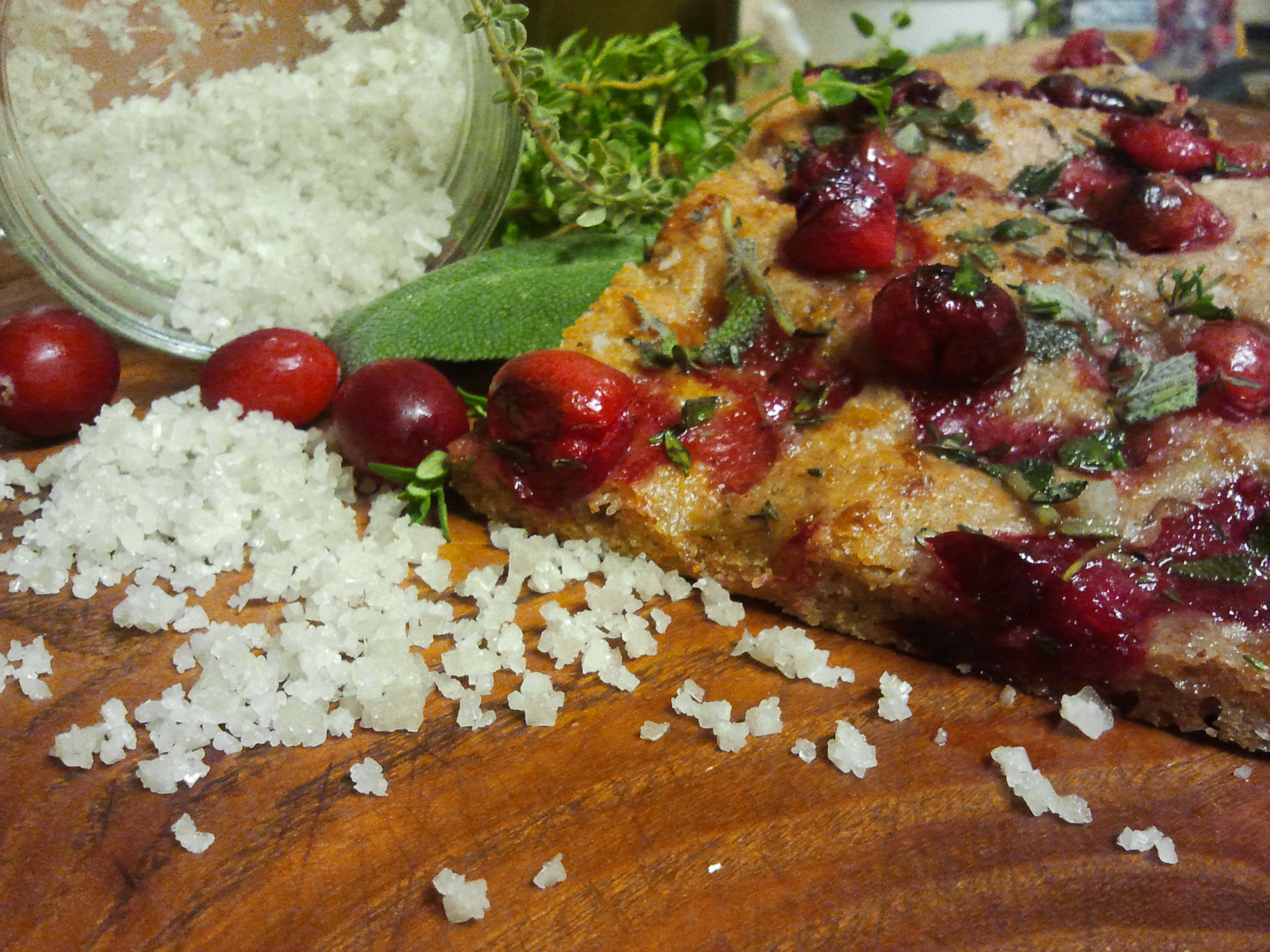 Focaccia is another of those recipes that is redolent with memories. I was introduced to this Italian snack in its simplest form, topped with olive oil and salt during college. The humanities department would have semi-regular meetings where all the professors and students would gather together. (It was a small school, so this wasn’t as big an ordeal as it may seem.)
Focaccia is another of those recipes that is redolent with memories. I was introduced to this Italian snack in its simplest form, topped with olive oil and salt during college. The humanities department would have semi-regular meetings where all the professors and students would gather together. (It was a small school, so this wasn’t as big an ordeal as it may seem.)
While we heard tell that other departments had the usual spread of chips, cookies, and soda, we were favored with homemade focaccia baked by our beloved secretary Elizabeth Davis. While she usually tried to keep a low profile in meetings, there was no disguising the warm yeasty smell that accompanied her through the door. She and her bread were the center of everyone’s attention. Even if we tried to politely finish listening to whomever was speaking, our minds and hearts were with her and the bread she was slicing.
Her focaccia stands in my memory as a culinary beacon of hope in an otherwise dreary foodscape of cafeteria food and boxed cereal. It was beguiling in its simplicity, managing to be both fluffy and crisp at the same time. The olive oil, warmed by the bread, pooled in the fingertip deep wells, dribbling over the sides when it was cut. The more refined among us ate with a napkin in hand to dab at the drips. Call me rustic, but I could never resist licking my fingers clean of the buttery oil mingled with the sharp bite of salt.
While plain and simple focaccia still heats my oven, I have recently been enamored with recipes using seasonal fruits, like this Grape and Rosemary Focaccia from Nourished Kitchen. Living in the South, I made it with muscadines rather than concord grapes, but the combination of peppery olive oil, sticky sweet grapes, and salty herbs worked its way into my blood. Sadly, muscadine season is painfully short. Nowhere near long enough to satisfy my craving. When cranberries started poking around the produce, I saw my way clear.
While this recipe is obviously evocative of Thanksgiving, I won’t lie and say I’m not stashing a few bags of cranberries in my freezer so I can enjoy this a few months down the line.

Sourdough Focaccia with Cranberries, Sage, and Thyme
Inspired by recipes at Nourished Kitchen and The Fresh Loaf
1 cup frothy 100% hydration sourdough starter
1 cup tepid water
1 cup extra virgin olive oil, divided
2 cups whole wheat flour
2 cups white whole wheat flour
3 tsp salt
~ 1/2 a bag of cranberries
2 T chopped fresh sage
1 T chopped fresh thyme
2-3 T unrefined coarse sea salt
In the bowl of a stand mixer, combine the starter and water. Mix briefly to break up the starter. Add 1/4 cup olive oil, one cup each of the flours, and the salt. With a dough hook, mix the dough until it comes together. If it’s still excessively sticky, add more flour until it becomes more manageable– it can stick to your fingers, but it shouldn’t coat your hand like a glove if you try to knead it. Let the mixer knead it until you can stretch a piece paper thin, about 10 minutes. Roll it into a ball, drizzle the bowl with olive oil and turn the dough to coat. Cover with plastic wrap and place in the fridge over night.
The next day, let the dough come up to room temperature, about 60-90 minutes. Rub olive oil onto a 9×13 baking sheet. Pat the dough out to fit the baking sheet and let it rise, covered, in a warm place for 2-3 hours, until it looks puffy and doubled. Meanwhile, preheat the oven to 475°. After the dough has risen, use your finger tips to make several indentations in the dough. Not holes, just dips. Drizzle an ample amount of olive oil over the dough and down its sides. The bread is essentially going to fry on top, so do be generous. Sprinkle the coarse salt and then spread the cranberries out. They might roll into great cranberry canyons, so you might need to press them gently into place.
Bake in the oven for 20-30 minutes, until the top is golden and crisp. Take it out of the oven and drizzle some more olive oil and scatter the herbs over the top. Using a pizza cuter, cut the focaccia into squares. Serve hot or a room temperature. If you happen to have leftovers, it makes a fabulous breakfast reheated in a toaster oven for about 5 minutes.
This post is participating in YeastSpotting, a “weekly showcase of yeasted baked goods and dishes with bread as a main ingredient” hosted by Wild Yeast, though guest hosted this week by Hefe und mehr.
Posted 13 years, 1 month ago at 9:59 pm. 3 comments
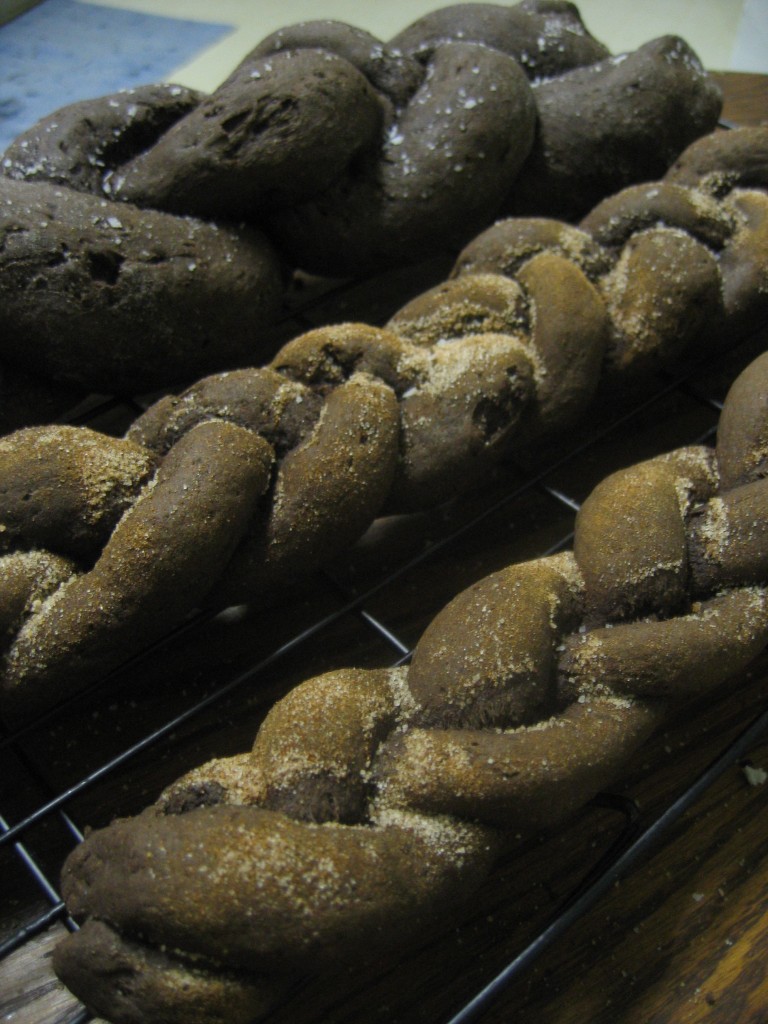 These were supposed to be cookies.
These were supposed to be cookies.
It all started with about an eighth of a cup of leftover sourdough starter that I just couldn’t bear to throw out. There had to be something I could make with it, right? A quick internet search revealed these sourdough cookies whose feet seemed to fill the shoes quite nicely. But, as often happens to me, I hadn’t even finished reading the recipe before I was fiddling with the specifics, imagining how I could tweak, alter, and otherwise change the recipe to fit my tastes. I’d had a hankering for spicy Mexican chocolate recently, so cocoa powder and cinnamon were added to the ingredient list. I also thought that a whole cup and half of sugar seemed excessive. Most recipes, even for sweet things, that I make these days rarely call for much more than 3/4 cup sugar. A full cup if I’m feeling generous and amiable toward the world. So obviously the sugar would need to be cut back. And why not go ahead and double it? If I’m going to the trouble of making cookies, why not have plenty to enjoy and share?
Even as I started the venture, a lecture was rolling in my head. “You know you’re not a baker, Jana. Perhaps you should rethink all these amendments and just make the recipe as is. Or at least choose just one alteration.” But I skipped ahead with an optimism born of past cooking successes. Hadn’t I turned those leftover scrambled eggs and sausage gravy into killer breakfast pitas? What about all the leftovers I’ve cunningly foisted in under the roof of “fried rice”? Surely something with such good things as butter, eggs, and chocolate can’t go too horrible askew, right? Six cups of flour, about a quarter of a box of cocoa powder, and God only knows how much cinnamon later, the cautionary voice in my head was proved right.
I am not a baker.
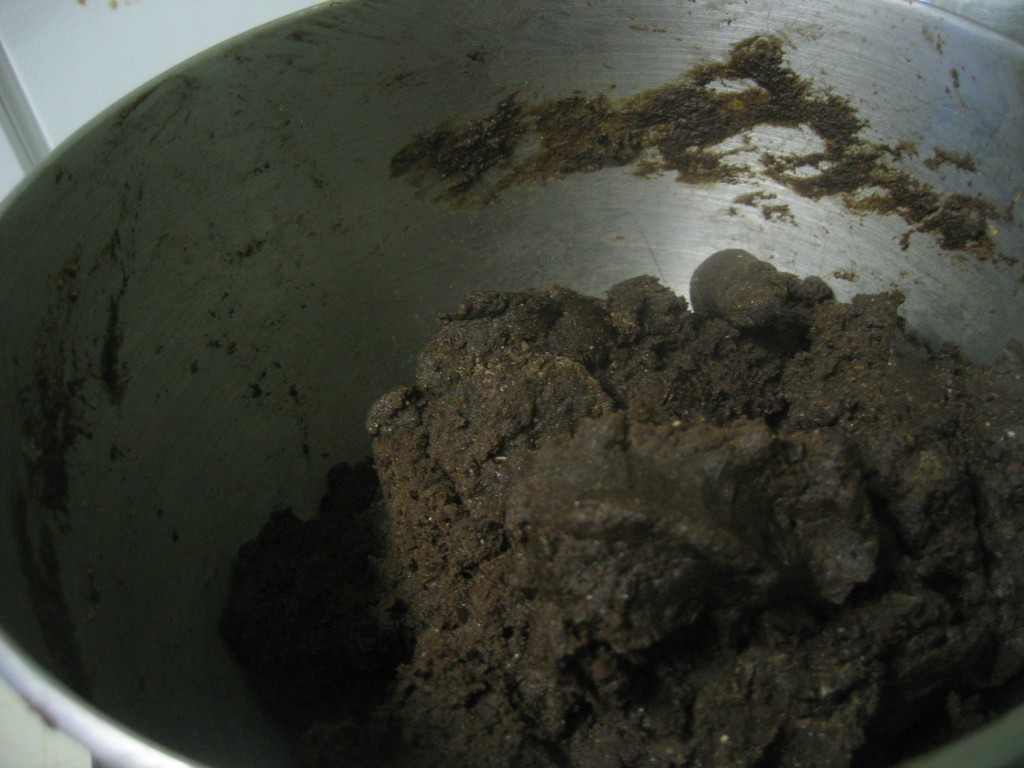
On the counter stood a bowlful of not quite bad, not really delicious, but definitely wheat-y tasting cookie dough. Don’t let the rich chocolate-y color deceive you. The thing stared me down, hands on hips, eyebrows raised, lips pursed. If it had been a miffed fourteen-year-old girl, it couldn’t have been more sassy. “So what now, Miss Creative Genius of the Fry Pan? Where’s your artistry now, huh?”
I quailed before it.
What had begun with my refusal to waste a few tablespoons of starter now had morphed into a giant ethical dilemma for my frugal nature. Here was a bowlful of half a dozen eggs, two sticks of butter, the last of my stock of chocolate, not to mention my cracking pride. The bowl had all these things in it, but what it definitely did not have was cookie dough. What to do? To give up and throw it out would be to admit defeat and make the waste of that dollop of starter sting even more. But I couldn’t possibly make cookies with it as it looked more like the pizza dough I’d made earlier that afternoon.
And with that, a thought occurred to me with the force and clarity of a forgotten proverb. If it looks like bread, tastes like bread, and acts like bread, then it probably is bread. And so I treated it like bread.
I debated whether or not to post the actual “recipe” for this bread. After all, it was a complete mistake. Since I didn’t even measure half the ingredients, how could I even be sure what the “actual recipe” was? However, I decided that the bread was good enough that I might actually want to make it again- in which case I would appreciate having a place to start from. So, baker beware! The following recipe should not be taken as gospel truth but instead as a draft that the baker ought to edit.
After a few tries of fashioning a free form loaf that always ended up looking like, well, some other amorphous brown substance, I settled on making braids. Though I tried several different sizes, I think the thicker the strands, the better.
Chocolate Sourdough Braid
1 cup butter
1 1/2 cup sugar
2 tsp vanilla
4 eggs
2 cups fresh sourdough starter
1/4 cup water
4 cups white whole wheat flour
2 cups whole wheat flour
2 tsp salt
1 tsp baking powder
1 tsp baking soda
1/2- 3/4 cup cocoa powder
3-5 T cinnamon
Preheat the oven to 375 degrees. Cream together butter and sugar. Add eggs one at a time. Then add the vanilla extract. Gently mix in the water and sourdough starter. In a separate bowl, mix together the dry ingredients. Combine the wet and dry ingredients. Allow the dough to rest for 15 minutes. To make the braids, take three equal balls of dough (the size is up to you, just make sure they are all equal). Using your palms, roll each ball into a long log, just like how you did with playdough as a three year old. 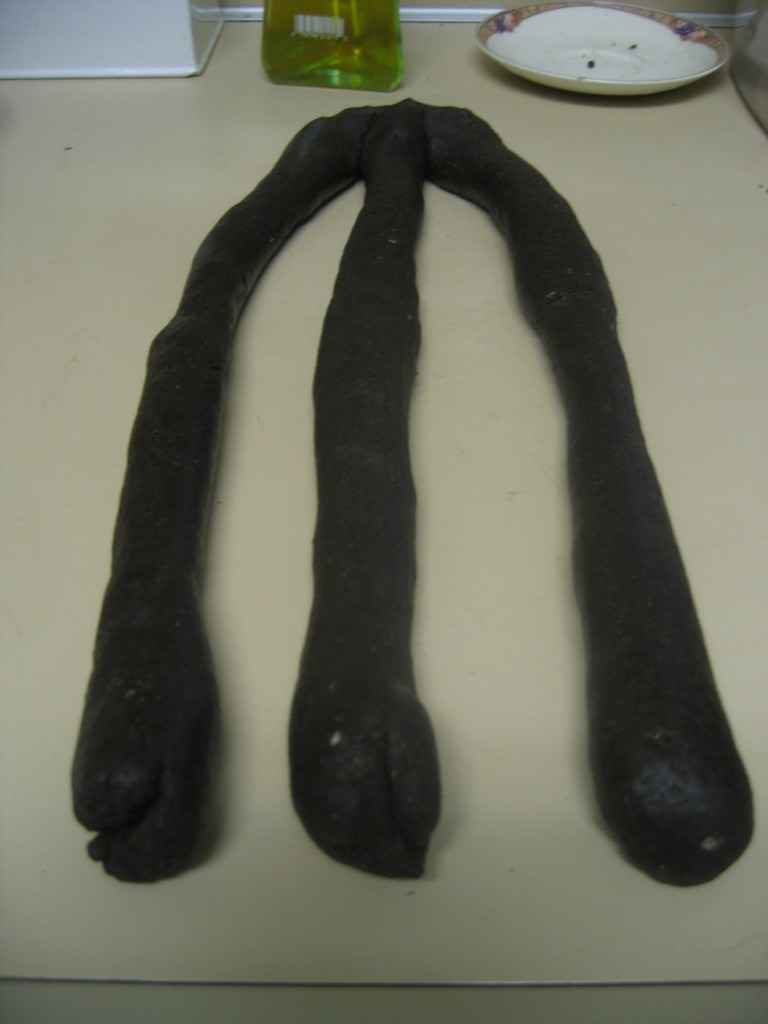 Next, squish the top ends of the logs together. You are going to braid the strands together, just like hair. If you haven’t braided before, go find someone’s little sister to help you. Or use the pictures below.
Next, squish the top ends of the logs together. You are going to braid the strands together, just like hair. If you haven’t braided before, go find someone’s little sister to help you. Or use the pictures below.



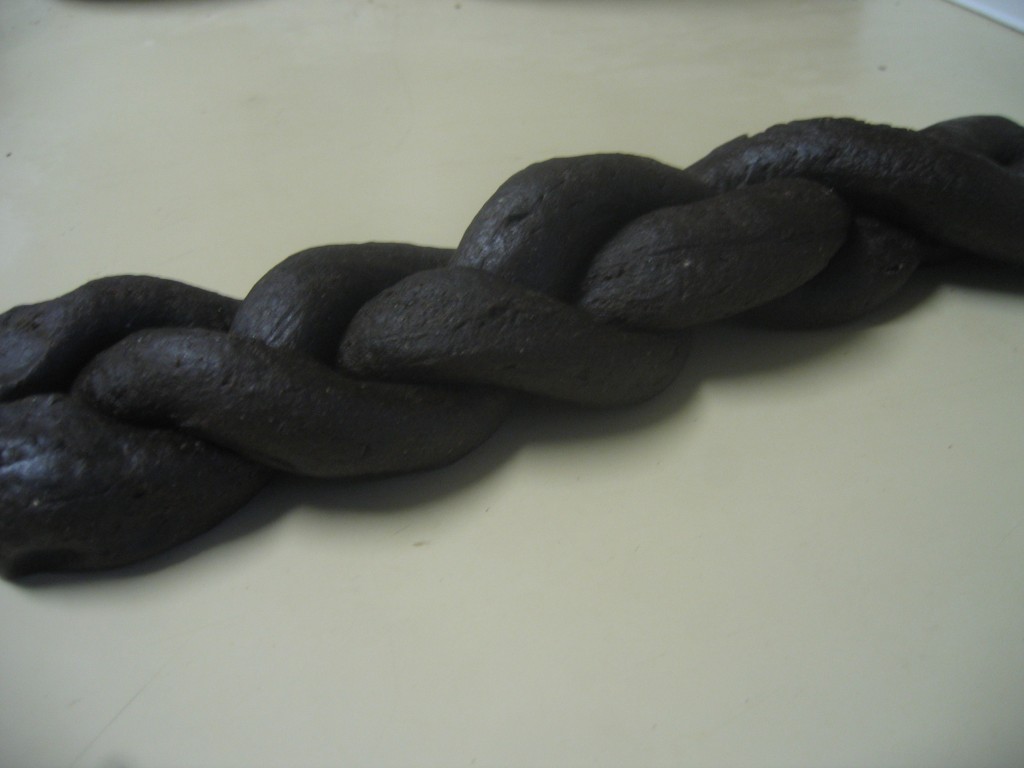 Once you’re done braiding, carefully transfer the loaves to a baking sheet. You can sprinkle them with cinnamon and sugar if you’d like. Or try coarse kosher salt, my personal favorite. Bake in the oven for 12-3o minutes, depending on the thickness of your loaves. Skinnier loaves will take less time, while thicker ones will take more time. To take the guess work out, use a probe style thermometer and bake the bread until it’s temperature reaches 200°. Cool on baking racks. Enjoy with butter, greek yogurt, or ricotta cheese.
Once you’re done braiding, carefully transfer the loaves to a baking sheet. You can sprinkle them with cinnamon and sugar if you’d like. Or try coarse kosher salt, my personal favorite. Bake in the oven for 12-3o minutes, depending on the thickness of your loaves. Skinnier loaves will take less time, while thicker ones will take more time. To take the guess work out, use a probe style thermometer and bake the bread until it’s temperature reaches 200°. Cool on baking racks. Enjoy with butter, greek yogurt, or ricotta cheese.
Posted 13 years, 10 months ago at 8:52 pm. 6 comments
 Focaccia is another of those recipes that is redolent with memories. I was introduced to this Italian snack in its simplest form, topped with olive oil and salt during college. The humanities department would have semi-regular meetings where all the professors and students would gather together. (It was a small school, so this wasn’t as big an ordeal as it may seem.)
Focaccia is another of those recipes that is redolent with memories. I was introduced to this Italian snack in its simplest form, topped with olive oil and salt during college. The humanities department would have semi-regular meetings where all the professors and students would gather together. (It was a small school, so this wasn’t as big an ordeal as it may seem.)







